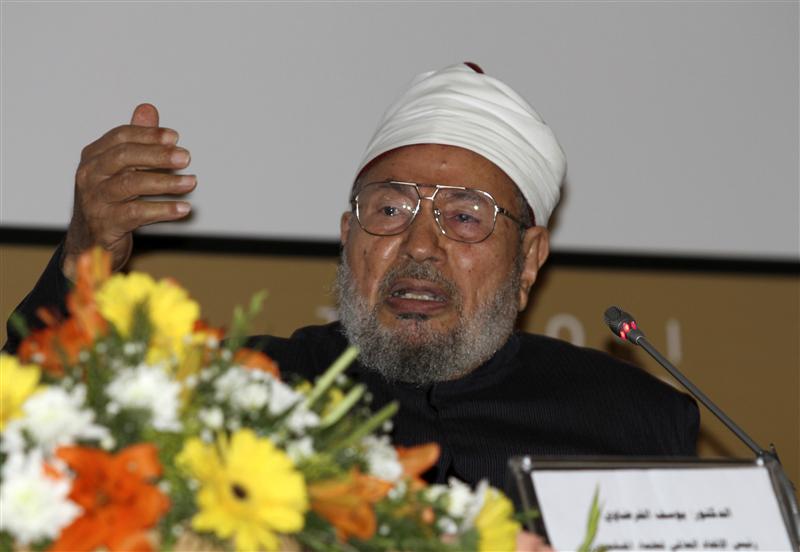Latest NEWS
- Aswat Masriya, the last word
- Roundup of Egypt's press headlines on March 15, 2017
- Roundup of Egypt's press headlines on March 14, 2017
- Former Egyptian President Hosni Mubarak to be released: lawyer
- Roundup of Egypt's press headlines on March 13, 2017
- Egypt's capital set to grow by half a million in 2017
- Egypt's wheat reserves to double with start of harvest -supply min
- Roundup of Egypt's press headlines on March 12, 2017
Islamist group condemns Egypt's Muslim Brotherhood death sentences

Islamic scholar Yusuf al-Qaradawi - Reuters
DUBAI, May 1 (Reuters) - An association of Muslim scholars led by influential Qatar-based cleric Youssef al-Qaradawi has condemned death sentences passed by an Egyptian court against 683 supporters of the Muslim Brotherhood as an act of revenge against political opponents.
The comments by the preacher linked to the Brotherhood could hamper efforts to end a diplomatic row that grew out of differences over Gulf security and policy over the 2013 overthrow of Egypt's Islamist President Mohamed Mursi.
Qaradawi's previous sermons and comments against the army-backed government installed after Mursi was ousted have been cited as one reason for a rift between some Gulf Arab states, led by regional heavyweight Saudi Arabia, and Qatar that had led to the unprecedented step of withdrawing ambassadors from Doha.
The 70-year-old leader of the Brotherhood, Mohamed Badie, and 682 supporters were sentenced to death on Monday, intensifying a crackdown that could trigger protests ahead of this month's presidential election.
"These sentences, taken in the shadow of the coup authority currently in charge of Egypt, are not based on any impartial investigation or a stable political environment, (something) that denies them any credibility and assert that they amount to (acts of) revenge against the opposition," the International Union of Muslim Scholars (IUMS) said in a statement on Qaradawi's website.
The United States, United Nations and European Union have all expressed alarm at the sentences.
But the comments by Qaradawi's IUMS may be seen as a fresh intervention in Egypt's affairs at a time when he had been trying to soothe the rift by saying all views expressed were his own and not those of Qatar.
Qatar supports the Muslim Brotherhood and shelters some of its members. Saudi Arabia has declared the group a terrorist organisation, as Egypt had previously done. The Islamist movement's ideology challenges the principle of conservative dynastic rule long dominant in the Gulf.
Gulf Arab states last month took a step towards resolving the rift by agreeing on ways to implement a security agreement they reached last year, but set no date for the return of the ambassadors.
Egyptian authorities have rounded up thousands of Brotherhood supporters since Mursi was overthrown by the army last year following massive protests against his rule.
Many have been held for involvement in protests against the government, and accused of crimes such as rioting, attacking police and disturbing the peace. The Brotherhood says it is committed to peaceful resistance to the army-backed government.
Badie, considered a conservative hardliner, was charged with crimes including inciting violence that followed July's overthrow, who is also on trial on an array of charges.
The Egyptian government has said the ruling was made by an independent judiciary and pointed out the rulings were a first step in legal process that can be appealed. (Reporting by Sami Aboudi; Editing by Alison Williams)










